STUDENT GUIDE AND GRADUATION RULES











The following “Student Guide and Graduation Rules” is the official document of reference for the curriculum rules of the CEMS Master in International Management (CEMS MIM) Programme for the academic year 2025 26.
You will find brief descriptions of the different programme elements, and the requirements that need to be met in order to be eligible for graduation.
When in doubt about any specific rule or its application, please contact your home school CEMS MIM Programme Manager. Contact details can be found on the CEMS website or on the CEMS portal

DISCLAIMER
Whilst every effort has been made to ensure the accuracy of the information contained in this booklet, CEMS cannot accept responsibility for errors. CEMS reserves the right to make changes to the information given and/or the content and availability of educational courses offered, without notice. Under no circumstances will CEMS be liable for damages arising out of or related to the information contained within these pages or pages of other CEMS websites or brochures.



CEMS is built on the foundational question “What do the global leaders of tomorrow need to learn today to be equipped to lead in an uncertain, volatile and changing world?” . In a global business landscape that’s constantly changing, the most valuable skill a person can have is the ability to adapt.
The CEMS MIM is a compelling choice for those seeking a truly versatile and geographically mobile international career. The CEMS community is united by a shared vision, which embraces both diversity and collaboration at its core.
The joint curriculum is cocreated and refined by Academic Directors from each member school, in conjunction with input from its 70+ CEMS Corporate Partners, Social Partners, as well as students and alumni. CEMS offers students global yet simultaneously local exposure to people, cultures, languages, academic philosophies and business practices. Students receive support to develop into multilingual highlyfunctioning worldly professionals of high integrity. Graduates become part of a committed, active and rewarding CEMS worldwide alumni network.
Equipped with knowledge, skills, attitudes and connections — ensuring our constantly changing world changes for the better the CEMS graduate’s competencies center around three key themes:
CEMS graduates have a clear grasp of the context in which they operate:
International business practitioners: CEMS graduates draw on their international learning experience and understanding of local history, economic, social, geopolitical, ecological, legal, cultural and institutional factors to develop solutions.
CEMS graduates draw on data and technology, and use evidence to drive business transformation and innovatively solve problems:
Data and business technology advocates: CEMS graduates confidently draw on their business technology awareness and analytical skills to
contribute to datainformed decisions and communicate these convincingly with the diverse stakeholders within and outside their organization.
Business transformation drivers: Our graduates are able to identify situations requiring change and take stakeholder dynamics into account, to help deliver business transformations and continuous improvements that address contemporary and dynamic organizational contexts.
Evidence based innovative problem-solvers: Our graduates, driven by curiosity, courage and an entrepreneurial spirit, can formulate creative solutions to complex business challenges and assume responsibility for calculated risks.
Our graduates lead their organization with the highest ethical standards and enable individual growth, both personally and in those that they lead and work with:
Ethical, responsible and inclusive citizens: Our graduates are committed to personal integrity, respect for diversity, integrity and inclusion and the need to holistically balance environmental, social and economic values to contribute to a more open, sustainable and inclusive world.
Reflective and resilient leaders: Our graduates are resilient, respectful, accountable, selfaware, empathetic, emotionally intelligent, and openminded, and continuously develop personally and professionally, in order to positively advance the people and organizations they work with and lead.
The joint CEMS MIM is at the heart of achieving these goals. CEMS combines core curriculum elements shared among the schools and complemented with unique courses stemming from the strengths and diversity of the vast network.
At the core of the programme are three elements: Global Strategy, Global Leadership and Business Projects with Corporate and/or Social Partners, enhanced by an international professional experience, an international academic semester abroad and mandatory multilanguage competencies.
Global Strategy enables students to understand and navigate the international business environment.
Global Leadership equips students with the knowledge and skills to manage people across borders and within multinational teams, creating culturally savvy individuals that show empathy and can relate to and interact with people of all backgrounds.
Business Project, conducted with Corporate and/or Social Partners, allows students to integrate theory and practice in multicultural diverse teams, tackling real business issues, across a range of fields.
The CEMS MIM emphasizes personal and social responsibility in business decisionmaking, leadership and citizenship, all informed by ethical reasoning, personal integrity, and respect for social diversity.
Fully aware of their personal responsibility and accountability and of the ethical and cultural framework in which leadership is exerted, CEMS MIM graduates can apply their multilingual, multicultural skills in the everchanging, dynamic world of international business and as responsible leaders can contribute to a more open, sustainable and inclusive world.

When applying to the CEMS MIM, please refer to the relevant member school’s local website to review the school’s master’s degree offer. Before applying to the CEMS MIM, please consider the following cost considerations.
// Student Registration and Handling Fee: CEMS charges students with a fee of €100. The fee is used to fund central administrative and IT services provided by CEMS to the students through www.cems.org, including student and alumni portals, student records database, career services platforms, graduation checking, digital certificates & diplomas, etc. Please see details on the CEMS portal and contact your home school CEMS MIM Programme Manager for local details and the method of payment.
Financial Aid: While students are responsible to cover the tuition fee associated with their programme, the Student Board has created a Financial Aid Guide to provide information on possible funds and scholarships at CEMS schools.
Visas: In certain cases, students may need a visa to be allowed to study in the country of the home and/or host school. Schools provide all necessary information and guidance in the process. However, students are responsible for obtaining the visa themselves, and may have to pay for a visa and all administrative and travel aspects of their education. It is important for students to obtain the necessary visa in a timely manner. Please contact your host school CEMS MIM Programme Manager, if in doubt.
Cost of Living: Students are responsible for the cost of living (food, accommodation, study materials, etc.) during their terms, taking into consideration the term abroad and varying differences in costs from country to country. Schools may have other financial requirements, such as health insurance, that students are responsible for. The CEMS Cities Guide serves as a valuable resource for ascertaining the cost of living and acquiring pertinent information about each city where a CEMS school is located.
Courses: Due to the considerable organizational and financial burden associated with hosting a Block Seminar, most member schools will request a financial contribution (between €100 and € 300) from students. Please contact the CEMS MIM Programme Manager for details on possible financial contribution to Skill Seminars and the Global Citizenship Seminar.
Languages: Some member schools request a financial contribution for language teaching and/or testing. Students are responsible for the costs of commercial tests and courses.
Career Forum and Regional Student Events: Students can benefit from participating in many student events within the CEMS network, which may involve travel costs and/or possible participation fees at their own expenses.
Graduation Ceremony: Students choosing to participate in the CEMS MIM graduation ceremony will be responsible for certain costs (travel, participation fee, dinner, invitation of guests, etc.) associated with the event.
Students applying to the CEMS MIM must: Be enrolled in a master’s programme in a selected CEMS member school by the start of their CEMS MIM studies.
Provide proof of academic preparation: have either received a Bachelor’s in Management or Economics or in a related field; or successfully passed minimum of 60 ECTS studies in business education in any of these areas at the time of entry to the CEMS MIM Programme (to be presented at the programme start). If applicable, provide a minimum of 600 points in GMAT or 555 in GMAT Focus.
Provide proof of proficiency in English (if not mother tongue) through any of the following (minimum level): TOEFL iBT100; IELTS (Academic) 7.0; CPE C; CAE B; BEC
Higher B; Pearson test of English Academic (PTE) 68; have a Bachelor’s diploma entirely taught in English from an English speaking country or in a CEMS or EQUIS/AACSBaccredited institution; have passed one of the CEMSaccredited locally accepted English tests; Alevel GCSE issued in Singapore. Currently, the CEMS MIM accepts the following online tests: TOEFL iBT Home Edition Test: a minimum score of 100 (with a score of at least 20 in each section); IELTS Online Test: a minimum score of 7.0.
Hand in a mother tongue declaration form: mother tongues are not tested but have to be declared upon application to the programme and cannot be changed after admission (see page 19).
English mother tongue local applicants to the CEMS MIM at Cornell SC Johnson College of Business (USA), The University of Sydney Business School (Australia), and University of Cape Town Graduate School of Business (South Africa) should check with the home school CEMS MIM Programme Manager regarding their eligibility for a language exemption.
Please note:

CEMS does not accept TOEFL MyBest Scores or IELTS Academic One Skill Retake. We only accept results from specific test dates.
In order to apply, students must follow the local application and selection procedure. The application requirements for the local master’s programme may differ from the CEMS requirements. Please consult the CEMS website for application requirements, periods, deadlines and details at individual CEMS schools.
On the application form, students have to indicate preferred destinations for their academic term(s) abroad. Students may also indicate during which term they wish to study abroad.
Among the CEMS student body are individuals with special learning, mental health, and physical needs, all of whom deserve equitable access to resources and opportunities. To ensure every student can thrive, the CEMS Student Services Database has been developed to better serve these students.
CEMS member schools, together with Corporate Partners, select candidates locally for the CEMS MIM. Based on the documents provided by the candidates, they may be invited to a selection interview or an assessment centre. Candidates will be assessed based on the following CEMS-wide selection criteria:
Intellectual Potential
Academic Excellence
Prior Knowledge in the Business Field
ATTITUDE & SOFT SKILLS
Desire to Achieve
Interpersonal Competencies
Integrity
Critical Thinking
Motivation for the CEMS MIM
Language Skills
International Openness and CrossCultural Aptitudes
The final decision on admission to the CEMS MIM is taken by the CEMS member schools based on the application material and the outcome of the interview/assessment centre.

Please note: In most schools, students are first selected for entry to the CEMS MIM, and then offered destinations for their term(s) abroad. Preferences for the location and the sequence are taken into consideration.
Once students are selected, they will be registered on the CEMS portal and automatically receive a welcome message with important information.

The CEMS MIM consists of three terms: two academic terms (Term 1 & Term 2) and the internship term (Term 3). The two academic terms must be consecutive (typically from August to July), while the internship (Term 3) can take place at any time during the graduate period of studies, but not overlapping with Term 1 and Term 2. Students must spend at least two out of the three terms abroad.
To complete an academic CEMS MIM term, students must successfully pass a minimum of 24 ECTS during each term. It is students’ responsibility to take a sufficient number of credits in each term.
The total credit requirement for the CEMS MIM programme is 66 ECTS. Students must complete all core curriculum requirements during the CEMS MIM year.

Please note: Based on the structure of the specific local master & MIM combination at the home schools, students spend one or two academic terms abroad.
Certain member schools’ term dates start earlier than other schools while some schools may have conflicts particularly in the January/ February period. The schools do their best to avoid overlapping of terms, but students should contact their home school CEMS MIM Programme Manager if in doubt. For exact term dates, please go to the “Programme Offer” section at each member school page on the CEMS website.
Failing to fulfil the minimum credit requirement and to complete the core curriculum elements during the CEMS MIM year will result in failing the CEMS MIM. For potential exceptions, see page 13.

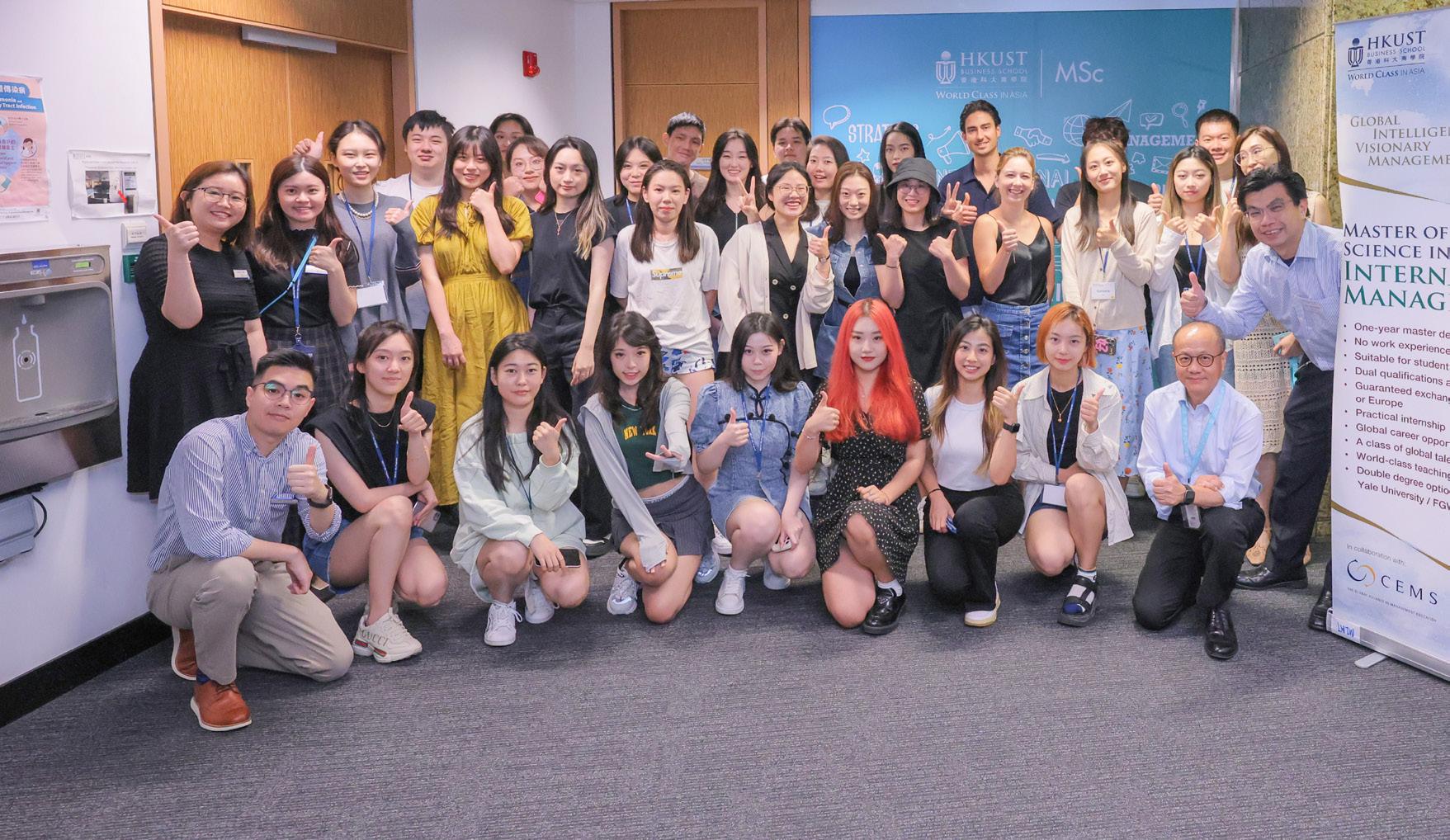
The Block Seminar is a oneweek course that takes place at the beginning of Term 1.
Block Seminars bring together professors and students from various CEMS member schools.
Subjects derive from different cultural and academic perspectives; many topics are not a part of the member schools’ standard curricula.
Depending on when Term 1 begins at different member schools, Block Seminars can take place between endJuly and mid October. As the Block Seminar is a mandatory element of the programme that can, under no circumstances, be postponed, class attendance is mandatory. It is the student’s responsibility to make sure that they attend a Block Seminar at the begin-
ning of the programme. The Block Seminar may overlap with the CEMS International Internship only when a contractually agreed holiday from the internship is declared. The Block Seminar accounts for 3 ECTS and students receive a grade.
Students are automatically assigned to the Block Seminar of their Term 1 school. In exceptional cases, with the permission of the school hosting the student during Term 1, students may apply for a Block Seminar different from the one held at their “Term 1 school” or a second Block Seminar
Topics, dates and exact locations are announced in the “Programme Offer” section on the CEMS website during Term 2 of the preceding academic year.


The Global Citizenship Seminar is a twoday course and takes place at the beginning of Term 2. The Global Citizenship Seminar brings together representatives from Corporate and/or Social Partners, professors and students for an experiential learning opportunity.
Within the Global Citizenship Seminar, students will have the opportunity to engage with the United Nations Sustainable Development Goals through experiential learning.
Depending on when Term 2 begins at different CEMS member schools, Global Citizenship Seminars can take place between January and April. As the Global Citizenship Seminar is a mandatory element of the programme that can under no circumstances be postponed, class attendance is mandatory. It is the student’s responsibility to make sure that they attend a Global Citizenship Seminar in Term 2. The Global Citizenship Seminar accounts for 1 ECTS. Students don’t receive a grade but the seminar can be failed if the learning objectives or full attendance requirements are not met.
Taking the Global Citizenship Seminar at a different school may in exceptional cases be allowed, but the student must obtain permission from the involved schools well in advance. Please verify this possibility with your home school CEMS MIM Programme Manager.
Schools may include a social event in connection to the Global Citizenship Seminar, in which participation can be declared mandatory. Social events may be organized in cooperation with local CEMS Clubs.

Please note: Both the Block Seminar and the Global Citizenship seminar may include a fee. Please see “Cost Considerations” on page 7
Every student has to participate in a Block Seminar at the start of the CEMS MIM. No exemption can be made, except for illness proven by a medical certificate or other serious personal circumstances documented. In such cases, the student will have to complete a Block Seminar offered at another institution during the same academic year or, if that is not possible, take a Block Seminar in the following academic year.
Likewise, every student must participate in the Global Citizenship Seminar at the start of Term 2. No exemption can be made, except for illness proven by a medical certificate or other serious personal circumstances documented, in which case the home school assists the student to find a seminar at another school or eventually postpones it until the following academic year.
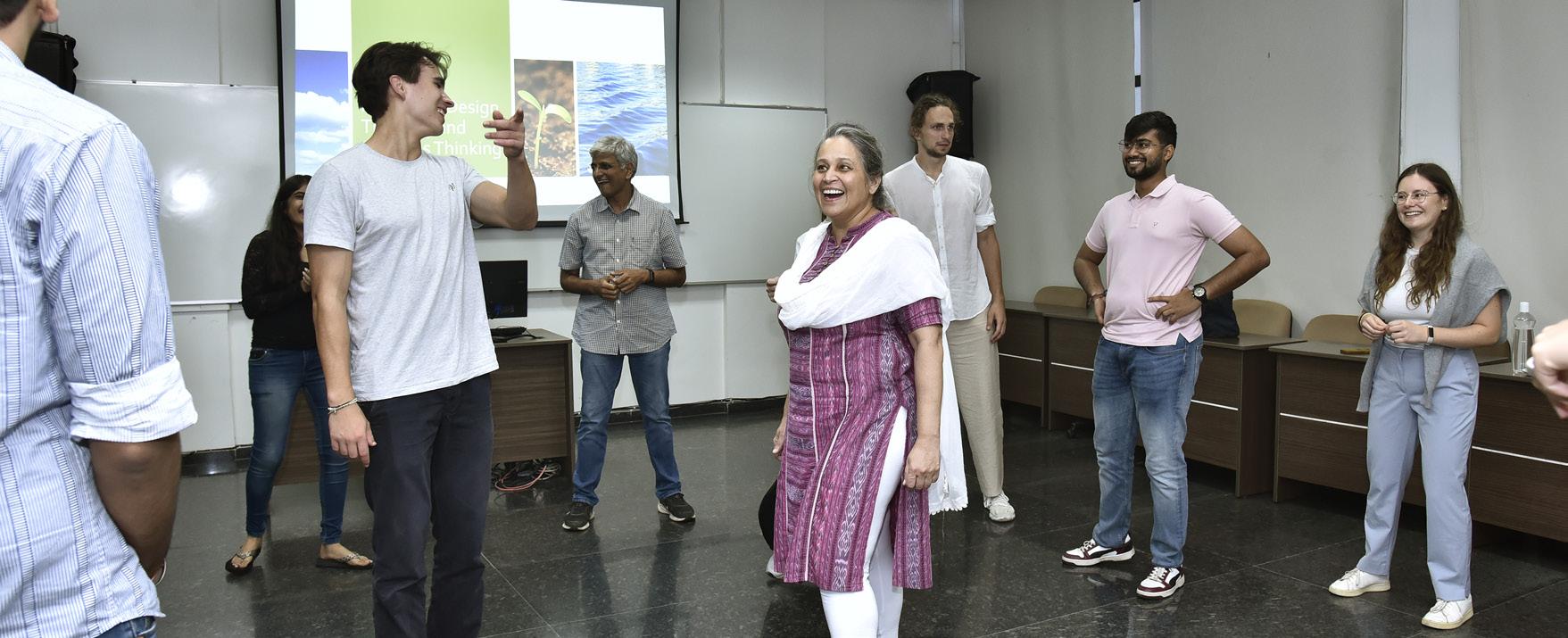
Students must pass CEMS Courses accounting for 45 ECTS in the CEMS MIM.
During Term 1, students have to successfully complete a CEMS Core Course in the field of Global Strategy. During Term 2, similarly, students have to successfully complete a CEMS Core Course in the field of Global Leadership. These specified courses are offered exclusively to CEMS students and need to be completed during the CEMS MIM year.
Students have to successfully complete Elective CEMS course(s) in which a minimum of 5 ECTS are “hard skills“ course. Hard skills courses emphasize the training of students’ quantitative and computational skills and expertise. The main focus of these courses is not the theoretical/conceptual background of these skills but their application and implementation in preferably real businessdecision settings. Schools can offer hard skill courses in the areas of business analytics, financial analysis, data science, statistics and econometrics, optimization and process planning.
The remaining Elective and Exclusive (Elective offered only to CEMS students) CEMS Courses are a selection of the best courses with an International Management profile chosen from the portfolio of the member schools.
Subject to the local programme portfolio, schools may also offer Open Elective Courses outside the Management/Business field in History/ Philosophy/Political Science etc. to develop a more holistic view. Open Elective Courses can only be taken during the CEMS MIM year, with a maximum allowance of 7.5 ECTS.
Students can also benefit from a CEMS Global Online Elective course offered in Term 1 of their CEMS MIM class year (see page 27). Member schools make a selection of CEMS Elective Courses available for all students of the current cohort in online format. Students can take one course from the selection and the ECTS received will count towards the CEMS MIM. However, whether the course will
count for the home degree master’s programme is subject to local rules.
A list of courses at all member schools can be found on the CEMS website
During the CEMS MIM year only:
CEMS Electives accounting for a maximum of 7.5 ECTS can be substituted by a Research Project (see page 16).
Coursework can include Open Electives worth up to a total of 7.5 ECTS.
During the year before or the year after the CEMS MIM year:
CEMS Electives and Skill Seminars, accounting for a maximum of 15 ECTS, may be taken outside the CEMS MIM year. This flexibility rule is subject to local regulation and may not be offered at all member schools. Please verify the possibility with your home school CEMS MIM Programme Manager. Credits taken before the start of the CEMS MIM will not have any influence on the selection process, may not have been accredited for a Bachelor’s degree, and cannot be substituted by a Research Project as above.
A student must pass a minimum of 24 ECTS in each academic term, and will be able to credit a maximum of 37.5 ECTS per term.
This includes courses, the Block Seminar, Global Citizenship Seminar, Skill Seminars and the Business Project, as well as a possible Research Project and open electives. Credits taken prior to or after the CEMS MIM year do not affect this requirement.
The following are subject to local regulation:
Grade conversion
Allowance of course or exam resit
Class attendance during the term
Guidance on using AI in coursework
For further information please contact the CEMS MIM Programme Managers.
Students must carry out a Business Project accounting for 15 ECTS during Term 2.
Business Projects reinforce the partnership between universities and companies in jointly shaping the students’ learning processes in international management.
They are consultancylike projects designed as a reallife learning experience for students: international student teams solve a real business problem as a oneterm, parttime activity. The amount of time spent on the project within the company may vary depending on its requirements. However, a Business Project will amount to about half of Term 2’s workload. Student teams work independently and are cotutored by academic and corporate representatives. Students receive a grade.
Student teams consist of 35 students. Ideally, at least one student will come from a foreign partner institution and at least one will be a local student. The school assigns students to individual projects, based on company preferences and didactical considerations.
Project results are evaluated by the academic and corporate advisors. Students may be requested to write a report and/or give a presentation, both as a group. The academic advisors may in addition require an individual process evaluation in order to gain a deeper understanding of the teambuilding process. Both the company and academic advisor evaluate the individual and team work.
Students gain insight into business life; training their analytical and problemsolving skills, applying research methods, transferring theoretical knowledge into practice, learning process management and acquiring intercultural social skills. They get to know potential employers and redefine their pro
fessional goals.
Students take responsibility for the project and strive for the best results. They share the workload within a team and communicate well with their advisors.. Each member of the team is expected to contribute their part to complete the Business Project. Peer evaluation is generally part of the evaluation process.

Students must attend Skill Seminars for a total value of minimum 2 ECTS (0.5 ECTS = 8 hours = 1 day).
Skill Seminars are training seminars in practical skills, which could be conducted online or in person. They are essential to kickstarting an effective professional career and fundamental to adjusting easily to an international management environment. Topics may include, but are not limited to:
Sustainability
Strategy skills
Personal and career development
Consulting skills
Marketing and communication skills
Leadership and teambuilding
Small groups ensure an interactive dimension. Skill Seminars are in most cases offered by the CEMS member schools, very often in close cooperation with Corporate Partners.
Company training sessions or other practical external seminars can substitute CEMS Skill Seminars when validated by the home school Academic Director.
Skill Seminar offerings can be found on the “Programme Offer“ page of each member school on the CEMS website
Please note: Please contact the CEMS MIM Programme Manager in charge for registration to Skill Seminars and possible financial contributions.
Due to Corporate and/or Social Partner involvement and/or the degree of planning required to organize Skill Seminars, CEMS takes Skill Seminar attendance very seriously. All CEMS students are required to adhere to the following policy:
Students must provide an advance notice of 5 working days to deregister from a Skill Seminar without explanation (length of advance notice may differ in case of the CEMS Career Forum).
Please note: For online Skill Seminars, students should have their camera on and actively participate throughout the seminar to have it validated. // // // // //

Alternatively, students can also find Skill Seminars via the CEMS Career Center, where member schools publish Skill Seminars that are open to all CEMS students.
Closer to the start date, only serious personal reasons (proven by official documents) will be considered in approving late deregistration without a sanction.
Students should be aware that each school may have different local rules that differ from the global CEMS Skill Seminar attendance sanction. Please consult with the Programme Manager for further information.
If none of the above applies and a student does NOT attend the seminar, he/she is NOT allowed to register for or to participate in Skill Seminars for the current and following term and earn credits. In addition, the student is put last place on the list of preference for Skill Seminars, Business Projects, and Block Seminars.
The student is removed from the CEMS MIM if 3 seminars are missed during the CEMS studies.

The Research Project is an optional programme element which can substitute CEMS Elective credits up to a maximum of 7.5 ECTS, and can only be done during the CEMS MIM year. It can lead to the thesis for the home studies, but a master thesis cannot be validated for a Research Project. The student is responsible for finding the professor and the topic, and for having the Project approved by the Academic Director of the home school.
The report is graded by the tutoring professor at either the home or host school.
Criteria for the CEMS Research Project:
“Issue-focused”: dealing with a concrete problem, be it a corporate, economic or theoretical problem.
“Internationality”: dealing with a question that applies to more than one country.
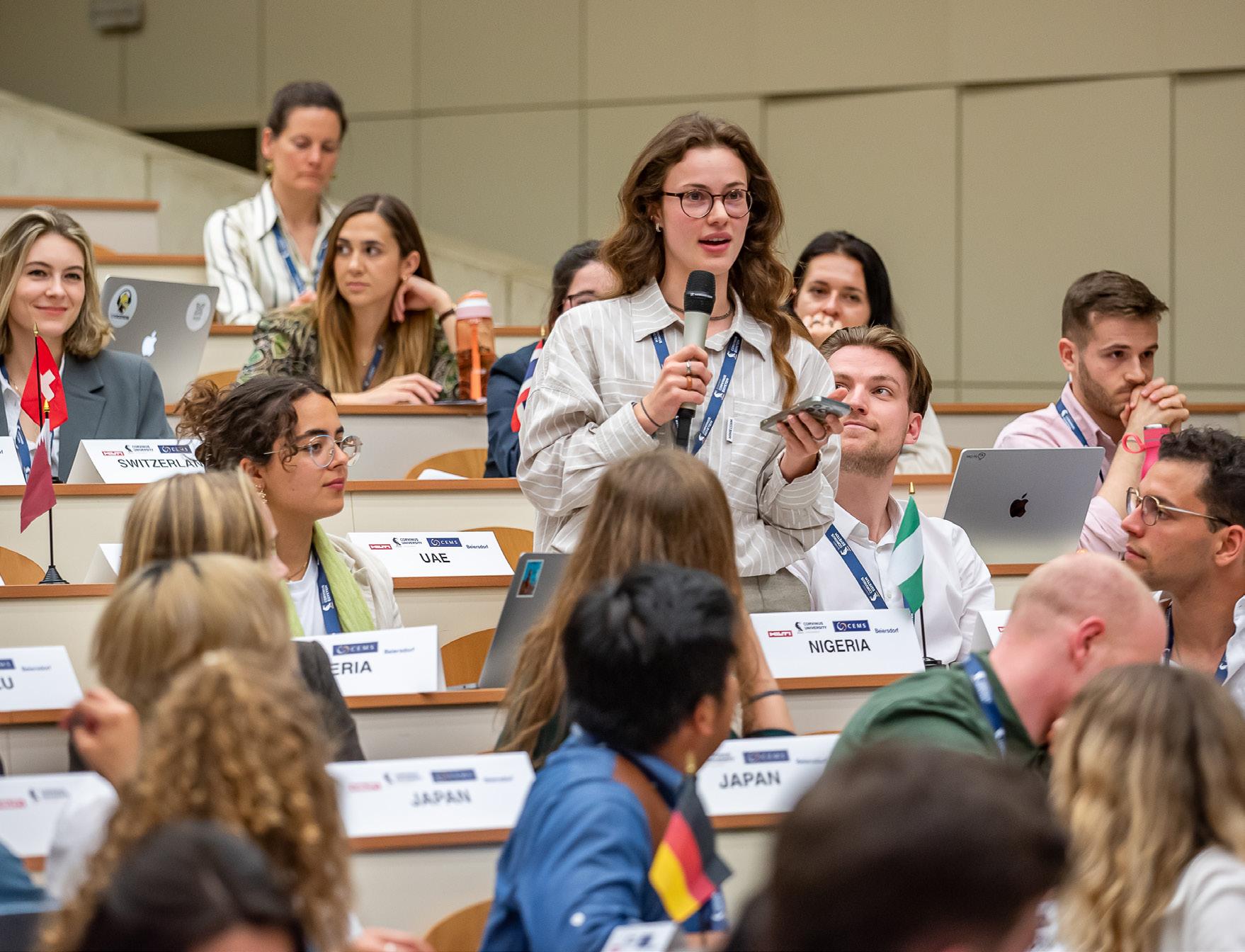

The CEMS International Internship is an essential component of the CEMS MIM programme. It is designed to provide students with valuable international professional experience. The main objective is to turn academic experience and theoretical knowledge into a professional, multicultural experience. It must therefore be at the graduate level of studies to provide valuable business experience. There are four approved formats for fulfilling the professional experience requirement: Internship
Previous work experience
First 8 weeks of fulltime employment
Studentled startup/entrepreneurial experience
Regardless of the format, the requirements must be met. For detailed information on the rules and fulfilling requirements of the CEMS International Internship International Professional Experience, please see the complete guidelines
International Defined
“International” in the CEMS internship is understood as experiences in which students engage in international work in a professional setting. As a guideline, this may include cases where students interact and collaborate on shared objectives with people from different backgrounds who may have different cultural practices, languages, or work expectations. Building cross cultural skills, adapting and influencing, navigating crossborder issues and gaining global insights are key compontents of the international professional experience.
Students are responsible for finding their own internship. Internships can take place at a CEMS Corporate or Social Partner; however, this is not a requirement. If students wish to receive internship offers by email, they can sign up for announcement notifications at the CEMS Career Center.
Students are responsible for all official documents required for employment. The “CEMS Internship Guide” gives help and information on internship
possibilities, visa and other regulations in each CEMS country. Students should research and be aware of visa requirements for working in the country where they plan to do the CEMS International internship.
The CEMS Internship includes a minimum of 8-week full-time placement within one organization. The role may be paid or unpaid at a forprofit or notforprofit organization, public service, or non governmental organization.
The professional experience must be a fulltime activity at the professional level (first job level, although salaries may not be commensurate) where the student is given one or more challenging projects with a certain degree of autonomy.
The student’s work must be supervised within the company and the company supervisor must complete an online evaluation form at the end of the internship or at the end of the CEMS mandated minimum 8 week period. In case of a studentled startup/entrepreneurial experience, an academic associated with the CEMS community should have the role as supervisor.
The professional experience must take place during the graduate level of studies (except during the two academic CEMS MIM terms), starting with the date when the student fulfilled all official bachelor’s degree study requirements.
Further conditions on the international internship are subject to local decisions based on home degree requirements.
Students must complete their professional experience by the first Sunday of November in the year of graduation. Furthermore, a maximum of 1.5 years can pass between graduation from the home degree and fulfilment of all other CEMS MIM requirements.
The professional experience must be approved by the home school before its start – except for Previous Work Experience (see below “Registration and Validation”).
The professional experience can overlap with the Block Seminar only when a contractually agreed holiday is declared. The student is responsible for providing official documentation to the home school CEMS MIM Programme Manager.
Inperson work experience is the norm and is understood to include some online engagement as per respective organizational policies. Approval of an entirely online experience will involve additional requirements and expectations.
Students must register their internship before its start on the CEMS portal for validation, providing the necessary information about the internship, including a valid work email of the supervisor. In any cases where a student is not physically relocating to fulfil the requirements of their internship/professional experience, students should demonstrate in the comment field: a short description of how their internship/ professional experience meets the CEMS definition of international that the organization they will be working for operates in at least two countries.
Home school managers verify the registered information. Once it is confirmed, students can start the internship.
An online evaluation form is automatically sent to the supervisor at the end of the internship. The submission of an evaluation form is essential for graduation, therefore, students are to ensure that company supervisors fill it in.
When the supervisor submits the evaluation form, the internship will be validated. The evaluation result is accessible to managers and students via the CEMS portal.
In case of studentled startups, supervision is carried out by an academic associated with the CEMS community. The student (owner) provides official founding documents on the company. Acceptance of a previous work experience must be confirmed by the home school manager and registered into the CEMS portal. To validate it, the evaluation form must be filled in online or uploaded into the portal (see below).
If there are technical issues that prohibit the supervisor from using the online evaluation form, the uploaded evaluation form has to be signed by the supervisor together with the company stamp or on a company letterhead. Refer to Steps to Register Internship Information to the CEMS Database for more details.

Note: Many countries can only offer internships to individuals having a student status at a university. CEMS as an organization cannot legally offer student status.
All CEMS MIM graduates must have language competence in three languages, one of which must be English.
The minimum CEMS language requirements are the following:

CEMS uses the Common European Framework of References (CEFR) for comparing language proficiency in languages.
There are six levels on the CEFR scale, where levels C2 and C1 describe a proficient user; levels B2 and B1 an intermediate user; and levels A2 and A1 a basic user of a language. CEMS defines A1, A2, B1 as the elementary level of studies.
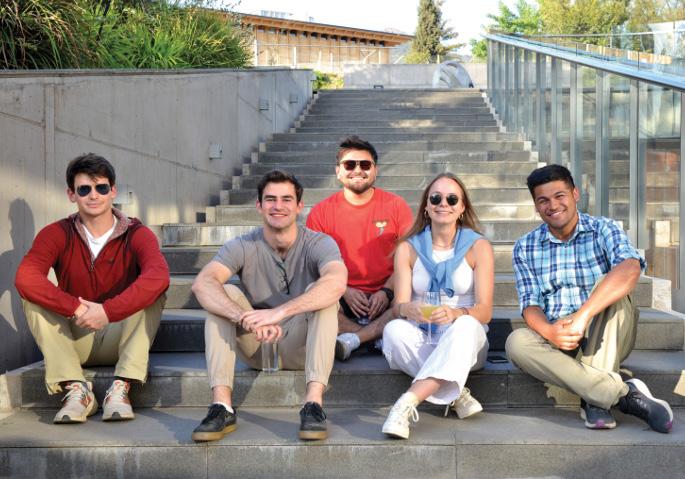
Please note: While these are the minimum requirements needed to pass the CEMS MIM, students are highly encouraged to take language or business communication courses and or tests at the highest level in as many languages as they master. The CEMS MIM certificate shows the levels passed in each language. Student should be aware that their home school programme’s language requirement may differ from the global CEMS language requirements. Please consult with your CEMS MIM Programme Manager for further information.
Students may declare more than one mother tongue. Mother tongues are not tested but a “declaration of mother tongue” is to be filled in upon application to the programme. Students cannot change their mother tongue once they confirm it during application. A declaration form is to be filled in for each language declared. Certain combinations of similar languages will not be allowed to fulfil the requirements. These are: Bosnian/Croatian/Serbian/Montenegrin/ Slovenian, Czech/Slovak, Danish/Swedish/ Norwegian, Danish/Faroese, Dutch/Flemish/ Frisian/Afrikaans, German/Luxembourgish, Russian/Ukrainian/Belarusian, Russian/Kazak, Spanish/Catalan and Spanish/Galician.
Language 2 Any language
Mother tongue
University Degree/ Secondary Education
C2/C1
Validity: Forever
B2
Validity: Max 5 years before the start of the CEMS MIM year.
B1
Validity: Max 2 years before the start of the CEMS MIM year.
A2/A1
Validity: Max 2 years before the start of the CEMS MIM year.
Language 3 Any language
Mother tongue declaration confirming the student’s ability to speak and write the language adequately is required.
Proof of secondary education/university degree completely fulfilled in a foreign language
Courses
Selected language courses at CEMS Universities
Commercial language courses at accredited cultural institutes
Tests
Accredited inhouse tests at CEMS Universities (subject to availability)
Commercial language tests accredited by CEMS
Courses
Selected language courses at CEMS Universities
Commercial language courses at accredited cultural institutes
Tests
Accredited inhouse tests at CEMS Universities (subject to availability)
Commercial language tests accredited by CEMS
Courses
Selected language courses at CEMS Universities
Commercial language courses at accredited cultural institutes
Tests
Commercial language tests accredited by CEMS
N/A
Courses
Selected Language Courses at CEMS Universities
Commercial language courses at accredited cultural institutes
Note: Elementary level language courses (A1, A2, B1) must have a minimum of 5 ECTS or 60 contact hours. The start of the CEMS MIM year is defined by the start of Term 1.
List of accepted commercial language courses at CEMS accredited cultural institutes
List of Commercial Language Tests accredited by CEMS
The CEMS MIM certificate will show grades using the ECTS grading scale. Based on the ECTS framework, a grading scale has been developed to facilitate the understanding and comparison of grades given according to different national systems. It has no national reference point and is intended to provide an objective evaluation of student abilities relative to those of other students within the same system. The ECTS grading scale is based on the rank of a student in a given assessment, i.e. how s/he performed relative to other students.
Those who have not achieved a sufficiently high level to be awarded a pass grade get: F (Fail – considerable further work is required)
For Block Seminars, CEMS Courses and Business Projects, the ECTS “A to F” grading scale is used. Skill Seminars and the Global Citizenship Seminar use “Pass” and “Fail” grades.
Translation of local grades to this scale is up to the grading institution. Please refer to an indicative guide on the local grade conversion to CEMS grades.
For the language tests, the language levels of the CEFR for languages are used.


CEMS requires that its students familiarize themselves with the codes of ethical behaviour outlined by member schools prior to the start of the CEMS MIM.
Students must not only familiarize themselves with their own university’s definition of fraud and disciplinary procedures for infraction, but must also be familiar with the ethical guidelines and procedures outlined by their host school.
Students who are uncertain where to find this information for either school should refer to their Programme Manager(s) for guidance.
Students must read and follow the ethical guidelines outlined by member schools and all infractions concerning the master’s programme
of member schools are handled solely by the member schools. However, if a CEMS student commits an ethical misconduct in relation to the CEMS MIM, the CEMS Graduation Committee has the right to inquire further into the case and eventually decide whether the student should be allowed to graduate from the programme.
All students may follow the process of appeals designated by CEMS. For further information regarding CEMS handling ethical misconduct, please see the CEMS Ethical Guidelines

To graduate from the CEMS MIM, a CEMS student must successfully fulfil the following:
Have spent at least two of the three CEMS MIM terms abroad
Have graduated from a local master’s programme officially connected to the CEMS MIM
Have completed the following 66 ECTS of course type elements:
Block Seminar at the beginning of CEMS MIM
Term 1: 3 ECTS
Courses including one course in Global Strategy and one course in Global Leadership during the CEMS MIM year; course(s) in hard skills of a total value of minimum 5 ECTS during the CEMS MIM: min. 45 ECTS
Global Citizenship Seminar in CEMS MIM
Term 2: 1 ECTS
Business Project in CEMS MIM Term 2: 15 ECTS
Skill Seminars: min. 2 ECTS
In each academic term, a total value of minimum 24 and maximum 37.5 ECTS may be credited towards the CEMS MIM
No more than 15 ECTS in Elective and Skill Seminar credits may be taken outside the CEMS MIM year
A consecutive 8week International Internship on firstjob level
Minimum language requirements
Have passed a second language with a minimum level of B1 oral and B1 written
Have completed an elementary study of a third language
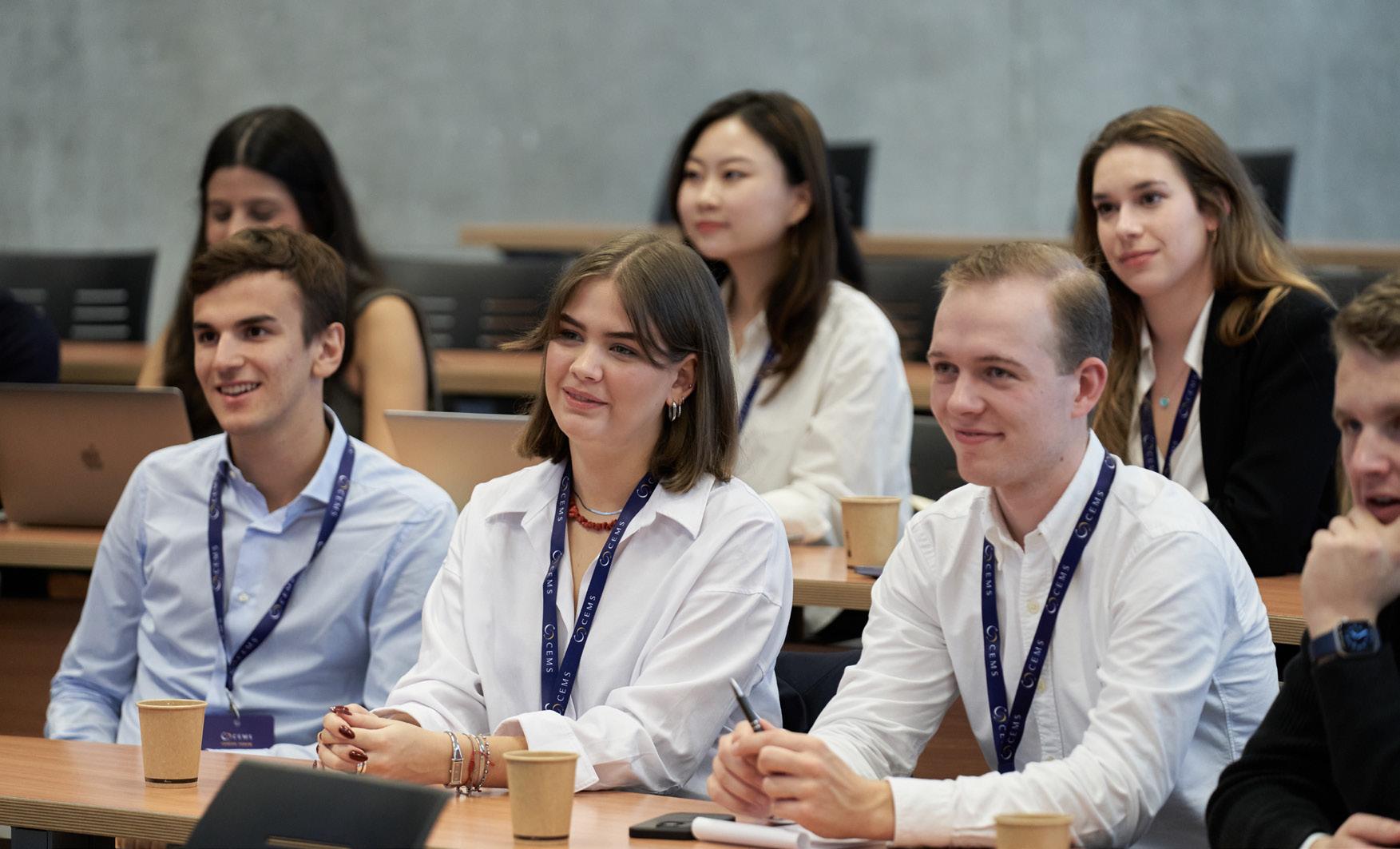

The Graduation Ceremony takes place each year during the CEMS Annual Events, which are hosted by one of the CEMS member schools.
To graduate, the CEMS student must have successfully completed all obligatory components for the CEMS MIM including the home degree by midOctober of the graduation year at the latest.
Exempted from this deadline are: an internship started no later than the second Monday of September and finished no later than the first Sunday of November, the home degree to be passed by the second Friday of November at the latest (both with written confirmation by midOctober), and a pending language test result (result to be presented by the first Monday of November).
Students have a maximum of 1.5 years to complete the CEMS MIM degree after graduating from their home school programme.
As an example, a student from CEMS MIM year 2025/26 graduating from the home school programme in June 2026 must fulfil all CEMS
Failure to meet this deadline will result in loss of entitlement to graduate from the CEMS MIM. In case of serious reasons, a student may request a postponement to be assessed caseby case by the CEMS Graduation Committee.
Starting in 2024, MIM certificates have transitioned to digital credentials , offering a secure and convenient way to verify qualifications online. This marks a significant stride towards sustainability and efficiency, compared to previous processes. Embracing digital credentials not only reduces the environmental footprint but also streamlines administrative procedures. Each digital document will be equipped with an authenticity code, ensuring seamless verification for anyone scanning it. This innovative approach not only modernizes the credential system but also enhances its security and accessibility, ultimately benefiting our stakeholders and reinforcing our commitment to technological advancement and sustainability. Upon completion of the CEMS MIM programme, each graduate will receive a unique link to their documents’ blockchain verification which can be shared through social media or through digital


The CEMS Global Online Electives course offering was initially a response to the Covid19 emergency in academic year 2020/2021. Thanks to the positive feedback from students and the strive to provide CEMS students with a wider course offer, schools continue to offer online elective courses in Term 1, thus expanding the CEMS experience for students.
The Global Online Elective course is an exclusive offer of regular elective courses (including hard skills courses) which has the same workload and participation requirement as other elective courses. Thus, it counts for the CEMS course credits. However, whether the course counts for the home degree master programme is subject to local rules. The course along with the grade and ECTS obtained appear on the CEMS transcript and certificate.

The CEMS Climate Change Course and its Model UNFCCC (United Nations Framework Convention on Climate Change) is a CEMS flagship semesterlong lecture series on the topic of climate change and climate policy. The lecture series is followed by a unique two day simulation of UN climate negotiations, where over 120 students from 10 CEMS universities play the roles of government, non government and industry representatives. During Term 2, the course curriculum at all universities is harmonized and comprises four modules, with the aim of levelling the knowledge of all students before the final climate change negotiation roleplay.

The Global Welcome and Virtual Induction meeting welcomes freshmen CEMS students in the new academic year and gives them a better understanding of the global community of CEMS. Beyond a detailed introduction to the diverse components and global opportunities within CEMS, encompassing the CEMS MIM, Student Board, CEMS Clubs, Career Forum, and various events, the session offers students a unique chance to actively participate. Through a breakout room setting, students can engage in interactive discussions, pose questions with their
respective home and/or host school(s), and gain in depth information regarding both the academic and practical aspects of the programme. The online session is organised in June and all selected students receive an invitation.

CEMS students have the opportunity to enroll in summer and language courses at certain CEMS schools. The objective of this initiative is to widen the global opportunities and advantages for CEMS students, beyond the existing home and host school experience. Schools offer places in their regular summer/intensive courses where the participation is selffunded by the students. The courses
are considered as regular CEMS elective courses, however, the eligibility for credit counting towards the master’s degree will vary based on the policies of the home school.



The CEMS organization, being a nonprofit association under French law, is governed by the the Strategic Board, the General Assembly and the Management Council, composed of representatives from CEMS member schools, Corporate Partners, Social Partners, the Alumni Association and the Student Board.
Under the leadership of the CEMS Chair and Deputy Chair, the Strategic Board and the General Assembly convene once a year, while the Management Council convenes continually throughout the year to set the strategic and operational framework of the organization. The Chairs are supported in their responsibilities by Committees and the CEMS Global Office, led by the CEMS Executive Director.
The CEMS Global Office is the permanent organizational body of CEMS, comprising members of staff who are responsible for senior management of the network, academic/quality management and coordination, corporate relations and services, contact to social partners, events and communications, and working with the elected student representatives of the Student Board and the CEMS Alumni Network. The team liaises closely with the Chairs and the
Committee chairs while supporting the implementation process of decisions taken by the boards.
The CEMS Academic Committee, formed by the local Academic Directors, the President of the Student Board and a representative of the Managers, takes decisions on CEMS MIM curriculumrelated questions with the aid of the Programme Subcommittee, which also acts as Graduation Committee, taking decisions on borderline cases. Academic Directors, CEMS MIM Programme Managers, and Corporate Relations Managers play an extremely important role. They are the driving force of CEMS in their local institutions. The CEMS MIM Programme and Corporate Relations Managers deal with students and companies on a dayto day basis while the Academic Directors are responsible for the implementation of the curriculum at the member schools. Most schools additionally appoint a Language Representative to the Language Advisory Committee who is available to answer questions related to examinations and language requirements, and eventually supports personal development.

In order to maintain a high standard of teaching, CEMS constantly develops its curriculum. Additionally all individual programme elements as well as the support services provided by the academic members are subject to a constant quality evaluation.
Online student satisfaction surveys are sent to the students upon finishing every major programme element through the CEMS Global Office.
Students are strongly recommended to complete these surveys, the results of which serve as a resource for the work of the CEMS Academic Committee and for local Academic Directors to monitor and improve the programme.


The Student Board is the voice of students within the CEMS Alliance. It consists of one elected representative from each member school. The Student Board focuses on advocacy, community building and best practice sharing among stakeholders while contributing to the overall development of the Alliance.
The Student Board achieves its goals through:
Gathering students’ opinions about CEMS and the CEMS MIM curriculum and providing recommendations to improve the programme and community life both locally and globally. Implementing and managing global projects that positively impact all CEMS students, with a focus on fostering social awareness, responsible leadership, and ethical conscience. Supporting local CEMS Clubs by offering guidance, promoting best practice sharing, and building a stronger network to help clubs achieve their goals.
In fulfilling these responsibilities, the Student Board acts as the official voice of CEMS students, representing their interests before the Academic, Corporate and Administrative stakeholders of the CEMS alliance.
The Student Board operates through eight specialized teams, each with a district focus:
The MIM team enhances the quality of the CEMS MIM programme by gathering student feedback and providing actionable recommendations.
The Marketing & Communication team increases Student Board visibility and promotes CEMS through impactful campaigns and social media initiatives.
The CEMS Club Support team supports and guides CEMS Clubs, faciliting knowledge sharing and organizing the annual CEMS Club Conference.
The Responsible Leadership team fosters students awareness of global challenges and promotes responsible leadership through impactful initiatives.
The Alumni Relations team collaborates with the CEMS Alumni Network to strengthen ties between students, alumni and stakeholders.
The Corporate & Social Partners team builds stronger engagement between students and CEMS Corporate and Social Partners through events and collaborations.
The Digital Innovation team tracks emerging tech trends and manages digital workspaces to improve task management and knowledge sharing within the Student Board.
The Global Integration Task Force team supports nonEuropean member schools’ integration into the alliance and advises them on best practices and strategies.
For concerns or any confidentiality issues regarding the CEMS MIM experience, students may reach out to the Student Board MIM team via mim.studentboard@cemsmail.org. The MIM team will facilitate the process of finding the right persons to resolve the issue.
CEMS students enjoy a very active student life at each school. CEMS Clubs constantly organize a variety of events on and around campuses as well as regional events yearly. The Clubs are integral in supporting the students’ CEMS experience as a whole and to ensure that the programme also provides a social and cultural learning experience for them on a local level.
CEMS Clubs have been set up to:
Drive the international student community
Enhance CEMS’ reputation
Strengthen the international network between students
Foster strong links with alumni
Foster strong links with corporate and social partners
The CEMS Club Awards is organized by the Student Board to recognize and celebrate the outstanding achievements of CEMS Clubs across the alliance. The CEMS Club Awards play a vital role in fostering a culture of excellence and collaboration across the CEMS network, motivating clubs to continue delivering impactful experiences for their members.
Global Responsibility Week is an annual initiative organized by the Responsible Leadership Team. This weeklong event aims to foster sustainability, inclusivity, and diversity across the CEMS community. Global Responsibility Week emphasizes the importance of social responsibility and equips students with the tools to make a positive impact in their communities and beyond. // // // // //
Foster innovative and progressive ideas to help CEMS grow


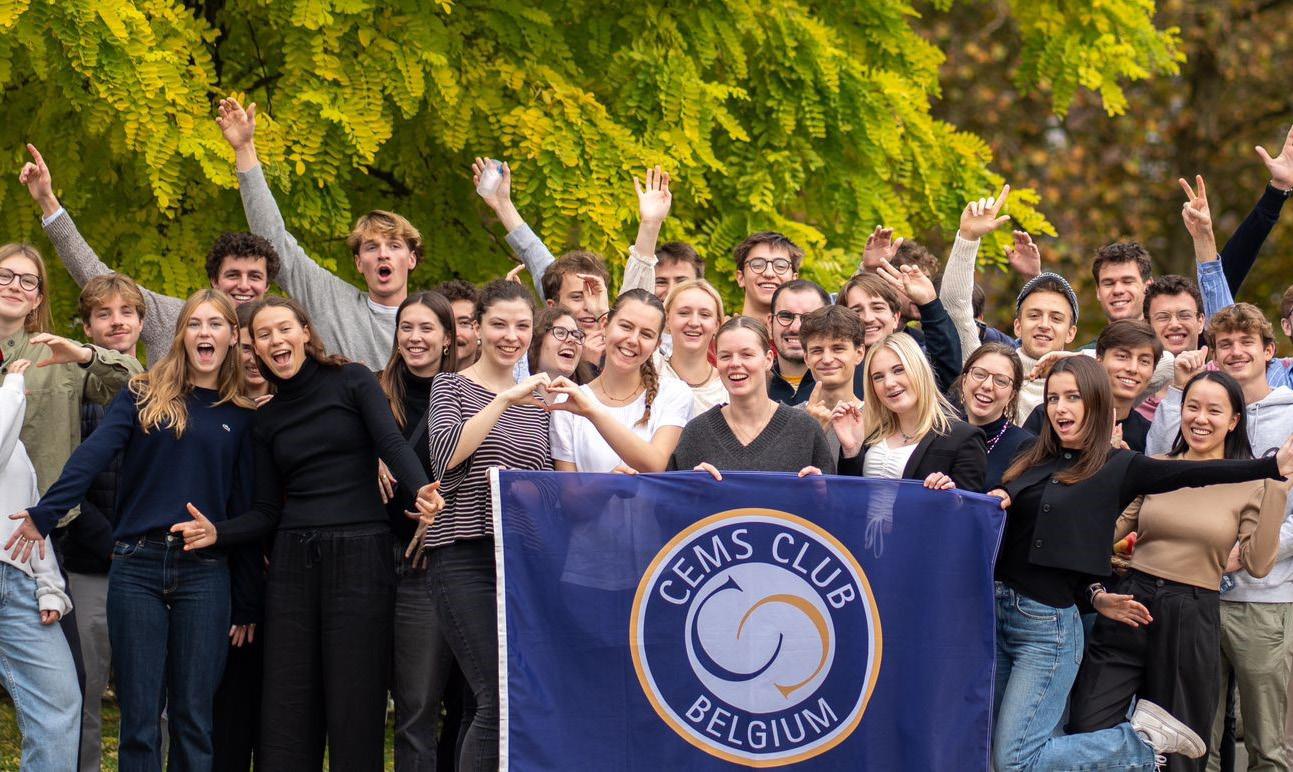
CEMS has an alumni network of 21,600+ alumni from 108+ countries, living and working in 75+ countries. This is indeed an incredible network of peers providing students with lifelong support from likeminded individuals throughout the world. During the CEMS student experience, alumni are readily available to network with students, mentor and support students’ endeavours and are always willing to share their experiences & career journeys.
Students benefit from the knowledge and experience of CEMS alumni via the online CEMS Mentoring Platform and the local StudentAlumni Mentorship Programmes (SAMP). These are vital
initiatives that enable alumni to provide guidance to future graduates on their career planning, personal development, and to provide support for a successful application and interview process.
Students can access the online CEMS Mentoring Platform with their cemsmail.org address via the CEMS Portal under the Career Services tab. Students should address their CEMS MIM Programme Manager, CEMS Club or Alumni Local Committee to find out more about the local SAMP.
If students are interested in entrepreneurship or the startup scene, then CEMS Entrepreneurs have just what they are looking for. If students are in need of advice or support, they can reach out to the CEMS Entrepreneurs for guidance.

Following graduation, students are automatically integrated into the network of peers. Students’ information is transferred from the CEMS portal to the exclusive CEMS Alumni Platform where they can learn more about the CEMS alumni community, network, check in with alumni from around the

objective of the GAW is to encourage professional network building & exchange, strengthen the interaction among students and alumni, and enhance the engagement and visibility of CEMS alumni. Read more about GAW 2025 .
Check out the CEMS YouTube Channel to watch webinars and open discussions organized by the CEMS Alumni Team and the Student Board featuring Alumni.
There are also a variety of CEMS Alumni Groups via LinkedIn and Facebook that students may join and follow, from CEMS Entrepreneurs to CEMS Alumni Finland, Australia & Singapore.
The CEMS Global Alliance offers a large range of events throughout the year for CEMS students. These events can be organised on various scale ranging from large global events to smallersized regional or local events.
These events are carefully designed by the CEMS Community to address the needs of CEMS students and can be related to career opportunities, recruitment fairs, networking & social activities, knowledgesharing conferences and so on.
The CEMS Global Events are exclusive CEMS recruitment and professional networking events. They are held twice a year in earlyNovember (CEMS Career Forum) and midMarch (CEMS Career Connect). Both career events are CEMS highlights for all students. The fairs are an ideal opportunity for CEMS students and young alumni to meet and interact with CEMS Corporate Partners, learn about opportunities for internships and permanent employment, and broaden their network. Each year, many students & alumni find their job or internship placement through these events.
The events comprise many activities:
Career trainings
CV advice workshops
Accredited halfday Skill Seminars
Prescheduled interviews
Coffee talks
Jobfair
All CEMS students as well as young CEMS alumni graduated within the last four years have the opportunity to attend the Career Fairs.
You can find the full list of events, activities, services, and platforms available to students in the CEMS Career Services Guide
On top of these, the CEMS Global Alliance organises the Annual Events. The CEMS Annual Events take place in late November / early December every year. Several events are organized over a fourday period: stakeholder meetings, the annual General Assembly and the CEMS MIM Graduation Ceremony. These events bring together around 2,000 people, including academics and administrators, alumni, students and their families. // // // //


Once students have entered the CEMS MIM, they are registered on the CEMS portal by their home school CEMS MIM Programme Manager. Students automatically receive a welcome message with a login and password and information on the host school and the CEMS MIM.
Most information is available in the public site whereas more personalized operations are located on the CEMS portal, where students have to log in. The CEMS portal offers the students the option to:
// // // //
Follow their curriculum/grades registered in the system
Register for Career Forum interviews and Skill Seminars, and the Graduation Ceremony
Get access to programme related documents in the Student Library
Pay the “Student Registration and Handling Fee“, if applicable
Access the CEMS Career Center including a CV creation tool, a job search engine, and useful career advice. This Center is also used by CEMS Corporate Partners interested in finding CEMS students and graduates for job/internship opportunities
Receive news from the CEMS Community as well as internship and job offers from Corporate Partners through the Career Center
Get information and register for community and regional events organized by the Student Clubs

Note: Take a look at the onepager overview containing all the relevant platforms, tools and social media that are available for CEMS students.


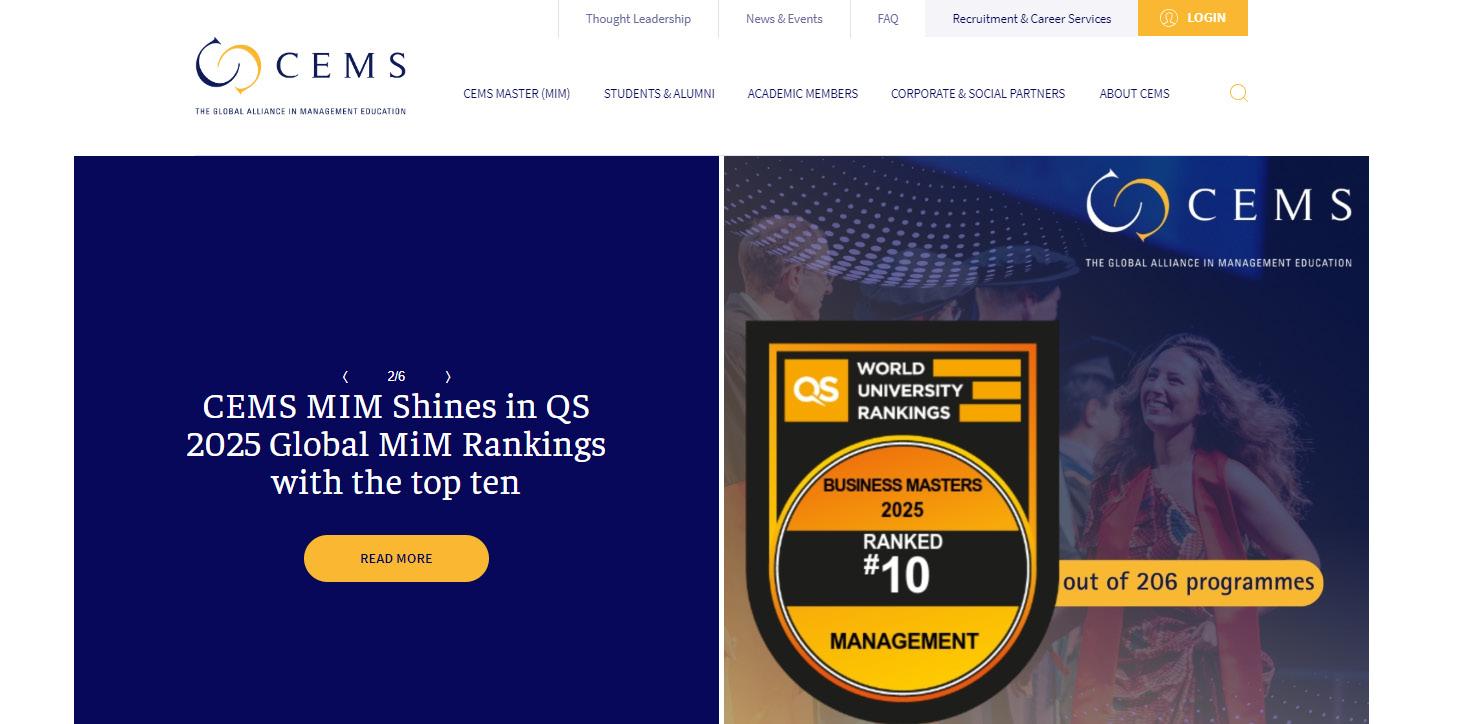
- as of January 2025
Australia
Austria
Belgium
Brazil
The University of Sydney Business School
WU, Vienna University of Economics and Business
Louvain School of Management
Escola de Administração de Empresas de São PauloFGV
Canada Ivey Business School
Chile Universidad Adolfo Ibáñez
China (Beijing)
China (Hong Kong)
Tsinghua University School of Economics and Management
HKUST Business School
Colombia Universidad de Los Andes School of Management
Czech Republic
Denmark
Prague University of Economics and Business
Copenhagen Business School
Egypt Onsi Sawiris School of Business at The American University in Cairo
Finland
Aalto University School of Business
France HEC Paris
Germany University of Cologne
Hungary
India
Ireland
Italy
Corvinus University of Budapest
Indian Institute of Management Calcutta
UCD Michael Smurfit Graduate Business School
Bocconi University
Japan Keio University
Korea
Norway
Poland
Portugal
Singapore
South Africa
Spain
Sweden
Switzerland
The Netherlands
Turkey
United Kingdom
United States of America
CARE International
Korea University Business School
Norwegian School of Economics
SGH Warsaw School of Economics
Nova School of Business and Economics
National University of Singapore
University of Cape Town Graduate School of Business
ESADE Business School
Stockholm School of Economics
University of St.Gallen
Rotterdam School of Management, Erasmus University
Koç University Graduate School of Business
The London School of Economics and Political Science
Cornell SC Johnson College of Business
- as of January 2025
European Space Agency
Global Alliance for Banking on Values
Fairtrade Labelling Organizations International
GROW Movement
Transparency International
United Nations Alliance of Civilizations
WWF International
- as of January 2025
ABB
ABInBev
Accenture
Airbus
AlphaSights Ltd
Amplifon S.p.A.
A.P. Moller Maersk
Bain & Company
Barilla Group
Beiersdorf AG
Beko
BNP Paribas
Boston Consulting Group
China CITIC Bank International
CMA CGM
CO2 Management AS
CocaCola HBC
Deloitte
DHL Consulting
E.ON Inhouse Consulting
EDP Energias de Portugal, S.A.
EF Education First
Equinor ASA
EssilorLuxottica
Gartner
Groupe SEB
Henkel AG & Co. KGaA
Hilti
Hitachi Energy
H&M
HSBC
Hyundai Motor Company
Inditex
JBS S.A.
KEARNEY
KONE
Kowa Company, Ltd
L’Oréal
Lufthansa Group
LVMH
Mastercard
McKinsey & Company
MercedesBenz Group
Merlin Entertainments
MET
METRO
MOL Group
Nokia
Oesterreichische NationalBank
Oliver Wyman
Plzeňský Prazdroj / Asahi
Procter & Gamble
Raiffeisen Bank International
Richemont
Robert Bosch GmbH
Roboyo
RWE
Salesforce
Sanofi
Santander Bank Polska S.A.
Siemens Healthineers
SimonKucher & Partners
ŠKODA AUTO a.s.
Société Générale
Technogym S.p.a.
UnibailRodamcoWestfield
Visa
Whiteshield Partners
zeb
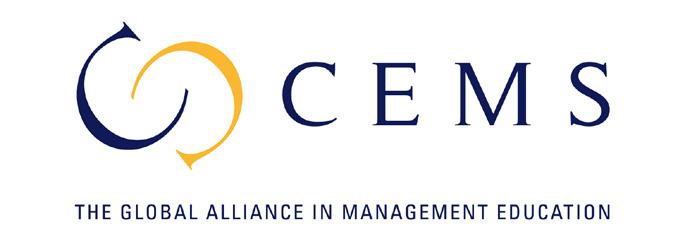
CEMS Global Office
1, rue de la Libération
78350 JouyenJosas
France mim@cems.org www.cems.org
Updated in January 2025